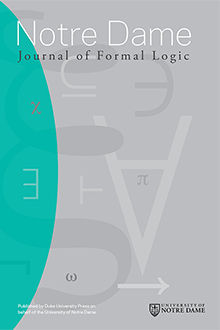Abstract
This work contributes to the program of studying effective versions of “almost-everywhere” theorems in analysis and ergodic theory via algorithmic randomness. Consider the setting of Cantor space with the uniform measure and the usual shift (erasing the first bit). We determine the level of randomness needed for a point so that multiple recurrence in the sense of Furstenberg into effectively closed sets of positive measure holds for iterations starting at the point. This means that for each there is an such that shifts of the point all end up in . We consider multiple recurrence into closed sets that possess various degrees of effectiveness: clopen, with computable measure, and . The notions of Kurtz, Schnorr, and Martin-Löf randomness, respectively, turn out to be sufficient. We obtain similar results for multiple recurrence with respect to the commuting shift operators on .
Citation
Rodney G. Downey. Satyadev Nandakumar. André Nies. "Martin-Löf Randomness Implies Multiple Recurrence in Effectively Closed Sets." Notre Dame J. Formal Logic 60 (3) 491 - 502, August 2019. https://doi.org/10.1215/00294527-2019-0017
Information





